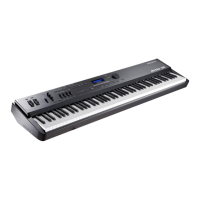Program Mode
The Layer Function
6-8
Split Key
Press the Param/Channel ▲button again to select the Split Key parameter. is sets the
keyboard key that will be the boundary between the left and right hand Programs on the
keyboard. e selected key will be the highest note for the left-hand Split Program. All keys
higher than the Split Key will play the right-hand Program. By default, the Split Key is set to
B3. e Split Key can be selected holding the Assign button down and then striking the
desired key on the keyboard. e Split Key can also be selected by using the Alpha Wheel or
– and + buttons. Split Key can be set to any key between A0 and C8.
Split Transpose
Press the Param/Channel ▲ button again to select the Split Transpose parameter. is
parameter allows you to transpose the left-hand Split Program in octaves so that you can play
it in higher or lower octaves. Use the Alpha Wheel or – and + buttons to set the Transpose
value. Transpose can be set to -24, -12, 0, 12, and 24. By default, Split Transposition is set to
+12.
Saving a Split
After setting the Split parameters, the Split can be saved as a Multi so that it can easily be
recalled in Multi Mode. Press the Save button to the left of the display to begin the saving
process.
See Save User Multis (page 7-8) in the Multi Mode Chapter for details on saving. Once
you have saved your Split as a Multi, you can continue to add Split or Layer Zones to the
Multi until you reach the maximum of four active Zones.
See the Split Function (page 7-5) and the Layer Function (page 7-6) in the Multi Mode
Chapter. Also, once you have saved your Split as a Multi, you can edit controller assignments
and other Multi parameters in Multi Edit Mode (see Multi Edit Mode on page 8-1 for
details).
The Layer Function
Pressing the Layer button while in Program Mode will perform the Layer function. e
Layer Function allows you to layer Programs and Multis such that more than one sound can
be produced by striking one key.
When you create a Layer in Program Mode, you are in fact creating a Multi with two active
Zones (see Multi Mode on page 7-1, for more information on Multis). As previously
described, Multis are congurations of four Zones, each of which may have its own Program
and controller assignments.

